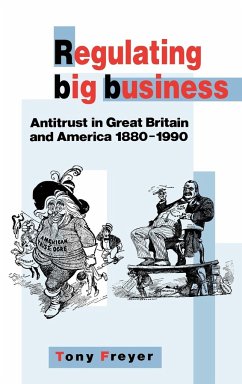In the late nineteenth century a new form of capitalism emerged in Great Britain and the United States. Before the revolutions in communication and transportation, the owners of firms managed the processes of production, distribution, transportation, and communication personally. By the end of the century, however, technological innovation and mass markets fostered the development of large scale corporate structures, leading to a separation between owners and operators. In this new form of capitalist enterprise managers were increasingly the principal decision makers. This economic transformation spawned social and political tensions which compelled the public and policy makers to decide upon an appropriate response to big business. A primary focus of public discourse was antitrust. This book explores the development of big business and the antitrust response in a comparative context. The author shows that government policies were a vital influence on the point at which managerial capitalism prevailed, first in America and then Britain, and that the search for these policies reflected the adjustment of the business order to changing economic conditions before and after managerial capitalism triumphed. Despite failures and inadequacies, antitrust often facilitated the development of flexible management organization, enabling corporations to adapt more effectively to changing economic conditions, and also increased the opportunity of smaller firms by limiting restrictive practices.
Table of contents:
Introduction; 1. The response to big business: the formative era, 1880-1914; 2. The divergence of economic thought; 3. The political response; 4. The courts respond to big business; 5. The impact of World War I, 1914-1921; 6. Tentative convergence, 1921-1948; 7. A British antimonopoly policy emerges, 1940-1948; 8. Uneven convergence since World War II; Conclusion.
This book explores the development of big business from 1880 to 1990 and the attempts to regulate it.
This book explores the development of big business and the antitrust response in a comparative context.
Hinweis: Dieser Artikel kann nur an eine deutsche Lieferadresse ausgeliefert werden.
Table of contents:
Introduction; 1. The response to big business: the formative era, 1880-1914; 2. The divergence of economic thought; 3. The political response; 4. The courts respond to big business; 5. The impact of World War I, 1914-1921; 6. Tentative convergence, 1921-1948; 7. A British antimonopoly policy emerges, 1940-1948; 8. Uneven convergence since World War II; Conclusion.
This book explores the development of big business from 1880 to 1990 and the attempts to regulate it.
This book explores the development of big business and the antitrust response in a comparative context.
Hinweis: Dieser Artikel kann nur an eine deutsche Lieferadresse ausgeliefert werden.








